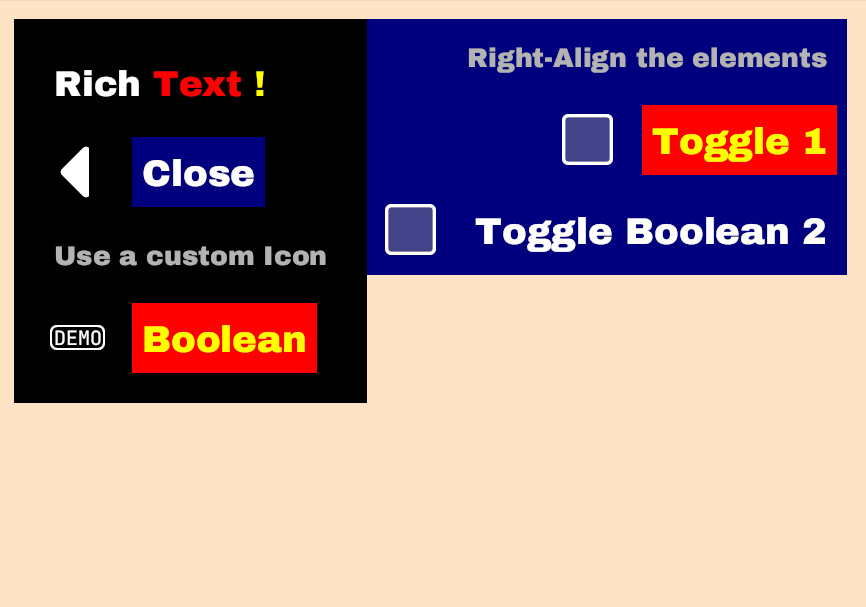5 releases
| 0.2.0 | Jul 11, 2023 |
|---|---|
| 0.1.6 | Jul 11, 2023 |
| 0.1.5 | Dec 4, 2022 |
| 0.1.1 | Nov 18, 2022 |
| 0.1.0 | Nov 18, 2022 |
#1978 in Game dev
77KB
1.5K
SLoC
🏃♂️ Bevy Quickmenu
Every game needs menus. Be it for the settings, for a pause screen, or for the main menu when the user enters the game.
While Bevy UI allows building menus, it is a cumbersome process especially if nested menus are needed. Even worse, though, is the effort required if you want your menu to be accessible with a keyboard, a gamepad, or the mouse.
Bevy Quickmenu offers all that. It is a super lightweight way of building in-game menus that can be controlled by all input devices. It even offers a simple way of having hover states. Everything can also be customized.
- Super simple menu plugin for bevy, building upon Bevy UI
- Keyboard, Mouse, Gamepad input is processed
- Support mouse hover states in simplified Stylesheet
- Many customizations possible (see examples/custom.rs)
Usage
Add to Cargo.toml:
[dependencies]
bevy_quickmenu = "0.1.5"
Version Compatibility
| Bevy Version | Crates Version |
|---|---|
| 0.11.0 | 0.2.0 |
| 0.10.0 | 0.1.6 |
| 0.9.0 | 0.1.5 |
Demo

Quick Examples
examples/basic.rs: Basic example to show how it worksexamples/settings.rs: Full blown user settings including switching game states and showing the menu againexamples/custom.rs: Showcase customization options
An explanation of the required components
State
A generic type that hosts the state of your menu (e.g. which items are selected, and so on). Whenever this state changes, the menu is automatically redrawn.
Action
(Conforms to ActionTrait): This enum defines all the actions your user can take. Such as SoundOn, SoundOff etc. When a user performs an action (by selecting the corresponding menu entry), the handle method is called on your ActionTrait implementation. ActionTrait has two generic types: Your State as well as a Event which you can define. This allows you to handle your action:
#[derive(Debug, PartialEq, Eq, Clone, Copy, Hash)]
enum Actions {
Close,
SoundOn,
SoundOff,
Control(usize, ControlDevice),
}
impl ActionTrait for Actions {
type State = CustomState;
type Event = MyEvent;
fn handle(&self, state: &mut CustomState, event_writer: &mut EventWriter<MyEvent>) {
match self {
Actions::Close => event_writer.send(MyEvent::CloseSettings),
Actions::SoundOn => state.sound_on = true,
Actions::SoundOff => state.sound_on = false,
Actions::Control(p, d) => {
state.controls.insert(*p, *d);
}
}
}
}
Screen
(Conforms to the ScreenTrait). Each page or screen in your menu is defined by this enum. Note that menu screens are not nested!. Instead the ScreenTrait has a resolve function that allows you to return the corresponding menu definition for the given enum:
#[derive(Debug, PartialEq, Eq, Clone, Copy, Hash)]
enum Screens {
Root,
Controls,
Sound,
Player(usize),
}
impl ScreenTrait for Screens {
type Action = Actions;
fn resolve(&self, state: &mut CustomState) -> Menu<Screens> {
match self {
Screens::Root => root_menu(state),
Screens::Controls => controls_menu(state),
Screens::Sound => sound_menu(state),
Screens::Player(p) => player_controls_menu(state, *p),
}
}
}
Menu
A menu is just a function that returns a list of MenuItem to be displayed. Each menu needs to have a distinct id. The example shows how the root and the sound menu are defined.
fn root_menu(_state: &mut CustomState) -> Menu<Screens> {
Menu::new(
Id::new("root"),
vec![
MenuItem::headline("Settings"),
MenuItem::action("Back", Actions::Close).with_icon(MenuIcon::Back),
MenuItem::screen("Sound", Screens::Sound).with_icon(MenuIcon::Sound),
MenuItem::screen("Controls", Screens::Controls).with_icon(MenuIcon::Controls),
],
)
}
fn sound_menu(state: &mut CustomState) -> Menu<Screens> {
Menu::new(
Id::new("sound"),
vec![
MenuItem::label("Toggles sound and music"),
MenuItem::action("On", Actions::SoundOn).checked(state.sound_on),
MenuItem::action("Off", Actions::SoundOff).checked(!state.sound_on),
],
)
}
MenuItem
In order to give you some flexibility, the menu item allows you to return five different types:
MenuItem::label: A small text label that cannot be selectedMenuItem::headline: A big text label that cannot be selectedMenuItem::action: A action that is performed when the user selects itMenuItem::screen: Dive into a screen when the user selects thisMenuItem::image: A single image (including an optionalStyle)
In addition, a menu-item can have one of a couple of pre-defined icons or a custom icon
MenuItem::screen("Controls", Screens::Controls).with_icon(MenuIcon::Controls)
MenuItem::screen("Save", Screens::Save).with_icon(MenuIcon::Other(icons.save.clone()))
MenuItems can also be checked or unchecked:
MenuItem::action("On", Actions::SoundOn).checked(state.sound_on)
MenuItem::action("Off", Actions::SoundOff).checked(!state.sound_on)
Displaying a Menu
Here's a the annoated setup function from the example:
impl Plugin for SettingsPlugin {
fn build(&self, app: &mut App) {
app
// Register a event that can be called from your action handler
.add_event::<BasicEvent>()
// The plugin
.add_plugins(QuickMenuPlugin::<Screens>::new())
// Some systems
.add_startup_system(setup)
.add_system(event_reader);
}
}
fn setup(mut commands: Commands) {
commands.spawn(Camera3dBundle::default());
commands.insert_resource(MenuState::new(
BasicState::default(),
Screens::Root,
Some(StyleSheet::default()),
))
}
Removing a Menu
In order to remove a menu, there's the bevy_quickmenu::cleanup function. Usually, it is best
to use it with the event that Bevy Quickmenu allows you to register:
#[derive(Debug)]
enum BasicEvent {
Close,
}
impl ActionTrait for Actions {
fn handle(&self, state: &mut BasicState, event_writer: &mut EventWriter<BasicEvent>) {
match self {
Actions::Close => event_writer.send(BasicEvent::Close),
}
}
}
fn event_reader(mut commands: Commands, mut event_reader: EventReader<BasicEvent>) {
for event in event_reader.iter() {
match event {
BasicEvent::Close => bevy_quickmenu::cleanup(&mut commands),
}
}
}
Screenshot from the customized screen

Dependencies
~41–75MB
~1.5M SLoC